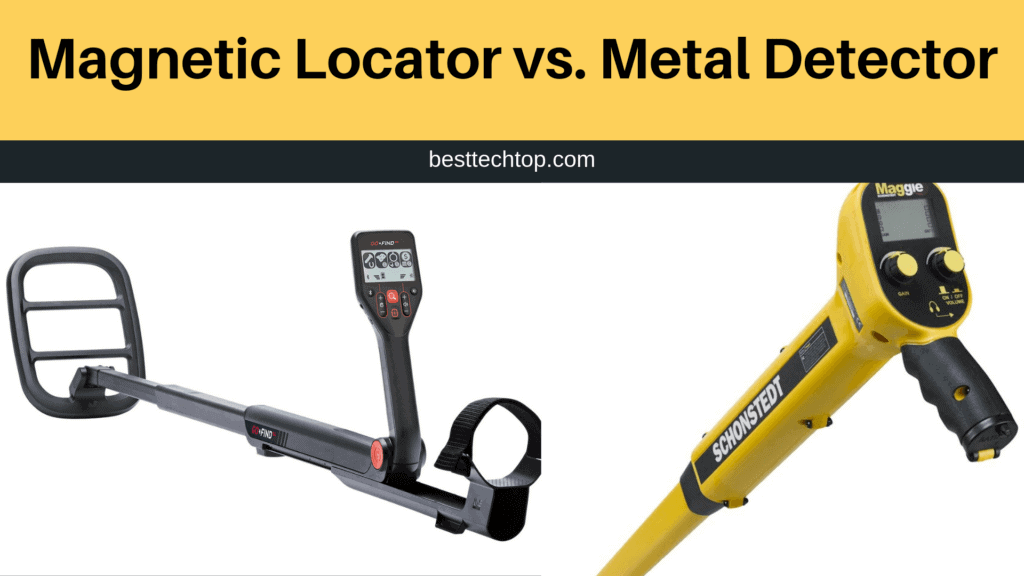Both magnetic locators and metal detectors are used for metals. Of course, one of the materials that we humans can’t do without is metal.
They are used in the construction of what we use in this modern period. Metals can be found to be of two major types. They are ferrous and non-ferrous.
Ferrous are metals that constitute iron, either in large or minute quantity, while non-ferrous metals don’t constitute iron at all.
It’s on this basis that both magnetic locators and metal detectors are defined; how?
Magnetic locators are used to find ferrous metals only, while metal detectors are used to find all kinds of minerals.
Furthermore, their functionalities are of no equal. In other words, magnetic locators are primarily active in the finding of ferrous metals than the latter. Its sensitivity is regardless of the size of the ferrous metal that one is searching for or the distance of the insulating material demarcating the ferrous metal to the tip of magnetic locators.
Nonetheless, there are quite a lot of peculiarities that differentiate the two from one another. In this article, we’ll be considering eight significant factors that differentiate them from each other.
We also reviewed these metal detectors:
- Treasure Cove Metal Detector
- RM RICOMAX Metal Detector
- Garrett ACE 200 Metal Detector
- URCERI GC-1028 Metal Detector
Magnetic locator vs. Metal detector 8 Things to Consider:
1) Versatility
- This is the quality a tool possesses to perform more than one task. Just as I’ve stated earlier on that magnetic locators are great in detecting objects that are subject to magnetism while metal detectors can be used in detecting metals that are and are not subject to magnetism.
- Metal detectors are constructed in a way that a unit can offer some options that an operator can opt from. It depends on the product that’s purchased though.
- In a nutshell, the metal detectors are used for finding metals that are provided on a specific product that’s purchased while magnetic locators don’t offer options for operators to opt from.
2) Magnetic Locator
- Magnetic locators are electronic devices whose sensitivity can be adjusted. They have wands just like metal detectors which an operator can utilize in lugging the unit from one place to another.
- Most products make sounds to notify users whenever a ferrous metal is detected. Although they are used for detecting irons and steel, yet they are often made of non-ferrous metals such as to elongate the longevity futuristic of the unit.
- Apart from the fact that it makes sounds, the intensity of the sound it reproduces can be adjusted. It doesn’t have coils, and neither is its wand detachable. So, it depends on where you look forward to saving it.
3) Metal Detector
- Metal detectors have adjustable and removable rods.
- There is a coil at the tip which aids in the detection of metals.
- They are electronic devices that use batteries to enhance their performance.
- They make sounds whenever metal is discovered.
- Some products have screen displays and buttons which operators can utilize in determining the functionality of the unit.
- There is also a handle that anyone can utilize in gripping the wand of the unit.
- Operators can utilize this to find a specific type of metal and can equally be used for finding universal/all variety of metals.
4) Sensitivity
- Provided you’re in search of ferrous metals; then it’s advisable that you opt for magnetic locator, you know why?
- It’s because magnetic locators are more sensitive than metal detectors. Metal detectors have a low sensitivity compared to the former.
- Metal detectors can detect a metal that’s 6-10 inches beneath an insulated surface such as sands.
- However, magnetic locators are more functional, and their sensitivity has more capacity to cover a wide range from the tip of the detecting device. The sensitivity of magnetic locators is more reliable than that of metal detectors.
5) Costs
- However, it all depends on what you need actually. For professional searching of metals, especially ferrous metals, you’d in no doubt need a magnetic locator to get your work done quickly.
- If you’re finding a non-ferrous metal, then you can then opt for metal detectors. Their prices are almost the same. What matters is the manufacturer that produced the unit. In other words, it’s the manufacturer that determines the cost. Notwithstanding, magnetic locators are often pricey compared to metal detectors.
6) Usability
- Metal detectors are more natural to save than magnetic locators because they are detachable.
- They have almost the same functionalities, but their designs are different.
- Metal detectors are more versatile in use than magnetic locators.
- They can be used in all kinds of soil conditions, both wet and dry soils.
- Their wands and tips are water-resistant. Their rods also are durable reliable for use.
- They both have functions on them, but metal detectors comprise more tasks because of their versatility.
- They are all electronic devices that use batteries to notify operators whenever metal is found.
7) Reliability
- Both products are reliable, moreover, depending on the product that a user is using for his/her findings. Metal detectors are made for different types of users.
- Some products are made for kids. You’d find Emoji display on them. Also, some products are made for adults and severe findings.
- You’d know a product that is designed purposefully for a specific need if you opt for metal detectors. Magnetic locators are used for professional findings of metals.
- In a nutshell, metal detectors are made/designed for different purposes while magnetic locators are basically for professional findings.
8) Maintenance
- Both devices are easy to wash, and they can last for long. However, metal detectors are more comfortable to store compared to magnetic locators. Their maintenance capability depends on the product purchased and the available resources that are provided by the user.
Final Verdict
Now you know the differences and the similarities of magnetic locators and metal detectors. The writer explained eight significant features in which they are the same and different from each other.
The writer also made sure that it was very comprehensible. Nonetheless, we hope our readers have been able to determine what they need.
More Metal Detector Reviews:

